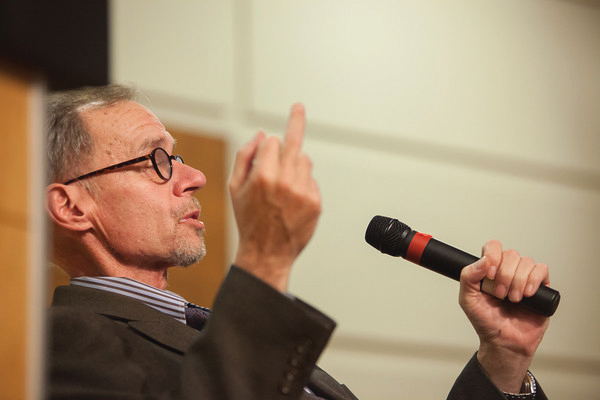David Carr was a trendy, sophisticated New York Times media journalist with a lot of spunk. A humdrum, rough-edged man who every aspiring student at his Dalton Camp lecture at St. Thomas University looked up to — including myself.

On Thursday, Feb. 12, Carr spent most of his day working on a lengthy interview with Edward Snowden, Laura Poitras and Glen Greenwald. He asked insightful questions about the issues their upcoming documentary, CITIZENFOUR, raises, like government privacy and security. It follows Snowden’s journey, and how he gained status in order to leak top-secret government files he felt journalists like Greenwald needed to tell the world. Carr went back to his office, prepared to work on the TimesTalks Conversation. He collapsed on the floor of his newsroom a few hours later at 9 p.m. and died. He was 58. An autopsy later revealed he died of complications with lung cancer.
“He didn’t seem to care who you were even though he interviewed all of these famous red-carpet people,” said Sam Laidman, a fourth-year journalism student at STU and news editor of The Aquinian, who spent an hour interviewing Carr one-on-one last year.
“He gave off the same vibe in person as he did on stage.”
Carr strode onto the stage with a jump in his step at the 12th annual Dalton Camp Lecture in Journalism in November, 2013. The auditorium overflowed with students, faculty, and an engaged Fredericton community eager to listen to Carr’s lecture, titled The Next Big Thing Has Finally Arrived, broadcasted on CBC’s Ideas.
“The challenge for media is: fight your way out of the clutter, be the signal amidst the noise,” said Carr, in his hoarse smoker’s voice.
He once proclaimed the Internet would completely transform media. In 2013, that’s exactly what happened.
“He saw the potential of social media in allowing a wider audience to break into the ivory castle of journalistic institutions,” wrote The Guardian about Carr.
We were so excited. This was David Carr, the most dominant figure in “Page One,” a documentary about the Times, and a media columnist who wrote with the same courage and determination he protruded on stage. And he started from humble, almost rock-bottom beginnings.
“I now inhabit a life I don’t deserve, but we all walk this earth feeling we are frauds. The trick is to be grateful and hope the caper doesn’t end any time soon,” wrote David Carr in his memoir, The Night of the Gun, where he reveals his former life in hell, when he juggled two talents: smoking crack and filing news.
Carr knew how to engage an audience. I was inspired. I pulled out my phone and started following him on Facebook and Twitter.
It was his final major radio performance in Canada.
I woke up late from a hangover Friday morning, reaching all around me for my phone. I found it, eventually, somewhere by my feet and painfully, holding my head with squinted eyes, scrolled through my news feeds on Facebook. A daily ritual.
“Carr is dead,” our professor, Jan Wong, wrote in the fourth year journalism group, posting a link to his interview from the day before.
I jumped from my bed, unable to find my glasses, stumbling around. “Carr is dead! Carr is Dead!” I screamed. No one responded. I ran into the living room, knowing I only live with one room mate. “Carr is dead! Carr is dead! How is Carr dead!” Nothing.
I went back to bed, in shock, regretting the pitcher from the night before. My head throbbed but I read every story I could find on Carr, posting a quote of his to my Instagram.
“I always thought that people who spent endless amounts of time drilling into their personal histories are fundamentally unhappy in their lives, and I’m not,” said Carr. “I’m ecstatic in my own dark, morbid way and subscribe to a theory of the past that allows the future to unfold: We all did the best we could.”
